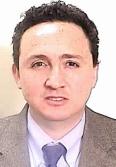About "Notes From the Field": With this occasional feature, we let World Bank professionals who are conducting interesting trade-related projects around the globe explain some of the challenges and triumphs of their day-to-day work.
 The interview below is with Pablo Fajnzylber, who recently became sector Manager for the Poverty Reduction and Economic Management (PREM) network in East Africa. The interview took place while Mr. Fajnzylber was Lead Economist and Sector Leader for PREM in Brazil. Prior to that, he worked at the Chief Economist’s Office for the Latin America and Caribbean region, the Finance and Private Sector Development Department for the same region and the Bank’s Development Economics Research Group. Mr. Fajnzylber has published extensively on a variety of development topics, including various books and articles in professional journals on issues related to growth, international trade, informality, crime, workers’ remittances, private sector development and climate change.
The interview below is with Pablo Fajnzylber, who recently became sector Manager for the Poverty Reduction and Economic Management (PREM) network in East Africa. The interview took place while Mr. Fajnzylber was Lead Economist and Sector Leader for PREM in Brazil. Prior to that, he worked at the Chief Economist’s Office for the Latin America and Caribbean region, the Finance and Private Sector Development Department for the same region and the Bank’s Development Economics Research Group. Mr. Fajnzylber has published extensively on a variety of development topics, including various books and articles in professional journals on issues related to growth, international trade, informality, crime, workers’ remittances, private sector development and climate change.
The Trade Post: What is your background?
Mr. Fajnzylber: I am an applied economist. I have done research on a variety of development topics including economic growth, the economic causes of violent crime, the links between trade openness and labor demand, micro-enterprise dynamics and the development impact of workers remittances.
The Trade Post: Please describe your current role in the World Bank (your overall responsibilities, in terms of countries and sectors).
Mr. Fajnzylber: I am currently the Lead Economist and Sector Leader for the Poverty Reduction and Economic Management (PREM) network in Brazil.
The Trade Post: Could you describe a trade project that you are working on that is exciting or that has had some interesting results?
Mr. Fajnzylber: I have just concluded a study, together with Daniel Lederman, in which we reviewed existing and new evidence on key challenges and opportunities brought about by Brazil’s discovery of significant “Pre-Salt” oil reserves off its coast. The study reviewed available evidence and long-term projections about the size of these oil reserves, as well as uncertainties related to these projections. It also assessed the potential macroeconomic policy and private-sector responses to the expected oil windfalls, including an analysis of potential Dutch Disease effects and distributive impacts associated with the likely appreciation of the equilibrium real exchange rate.
The Trade Post: What are some of the reforms that could come out of this project, and how would they help the countries where you work?
Mr. Fajnzylber: The study showed that it would be optimal for Brazil to save a significant share of the oil windfall, not only with the objective of reducing the volatility of the economy around oil-price fluctuations, but also to help ensure inter-generational equity, fund pro-diversification investments, help smooth the consumption of poor households during economic downturns, and prevent sudden exchange appreciations in the short run. The project also showed that the oil windfall creates an additional motivation for redoubling efforts to improve public investment management and ensuring that oil-financed social expenditures are as progressive as Brazil’s social programs. ::
The Trade Post: What kind of resistance are you getting to this type of reform, and how do you try to overcome it?
Mr. Fajnzylber: There is a natural tendency for Brazil to increase public and private consumption and indebtedness ahead of the expected rise in national wealth associated with the new oil discoveries. If, however, the newly generated wealth were to be smaller than anticipated, the country would have to go through a potentially painful adjustment in consumption. To minimize this risk, we recommend that policies be based on the most conservative projections for oil production growth. Similarly, if at least part of the windfall is to be used to finance public or private investments, there may be trade-offs between the quality of those investments and the speed at which they can be implemented. In other words, the project showed that it may be optimal for Brazil to pace the exploitation of the new oil reserves with a view to maximize their potential transformative impact.
The Trade Post: What are the challenges for the future in this arena, and how can the World Bank best respond?
Mr. Fajnzylber: Rapid growth in oil production and exports is likely to increase export concentration and macroeconomic volatility, as well as put pressure on other tradable industries. One of the main challenges in this area is to develop good practices for using natural resource windfalls to enhance the competitiveness of other sectors of the economy, including through more effective education and innovation policies that allow for accelerating knowledge and human capital accumulation beyond the oil and gas industries. The World Bank is well-placed to assist natural-resource-rich countries in addressing these challenges.


Join the Conversation